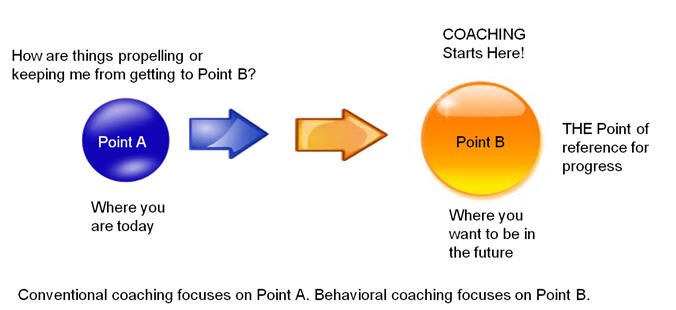Click on a category below to learn more:
One on One Coaching: Our Behavioral Model

Behavioral Coaching Definition:
A professionally structured, process-driven relationship between a trained professional coach and an individual or team, which includes: assessment, examining values and motivation, setting measurable goals, defining focused action plans, and using validated tools and techniques to help clients develop competencies and remove blocks to achieve valuable and sustainable changes in professional and personal behaviors (Skiffington and Zeus, 2003).
Why is the Behavioral Model Different from Most Coaching Models?
The majority of executive and management coaches today address only yesterday’s problems or, in other words, problems that were cited by the individual or organization based on past performance. Behavioral coaching recognizes current problems but places the focus on the future state that the client or organization wishes to achieve.

Frequently Asked Questions:
What is the return on investment (ROI)?
In a study conducted by MetrixGlobal, LLC, companies including Booz Allen Hamilton received an average ROI of $7.90 for every $1 invested in executive coaching.
Why does coaching work?
It helps the motivated individual clarify objectives and goals; aligns values, goals and actions; keeps individuals accountable for their own success; offers support; challenges; keeps the individual focused, reinforces changed behaviors; is based on validated techniques to change behavior.
What can I expect from my coach?
Confidentiality; reliability; specialty knowledge and training related to behavior change and leadership; challenging, supportive, honest and direct feedback; objectivity; commitment to client agenda and growth.
What can I expect from coaching overall?
In a study by Manchester Inc., executives reported coaching related organizational level improvement in a variety of areas including:
- Productivity
- Quality
- Organizational strength
- Customer service
- Reducing customer complaints
- Retaining executives who received coaching
- Cost reductions
- Bottom-line profitability
Among the benefits to executives who received coaching were improved:
- Working relationships with direct reports
- Working relationships with immediate supervisors
- Teamwork
- Working relationships with peers
- Job satisfaction
- Conflict reduction
- Organizational commitment
- Working relationships with clients
These kinds of results are repeated over and over when highly educated and trained professional coaches such as those in Wolf Leadership Development are retained as business partners.
How long does it take?
Our coaching engagements are normally 6-12 months in duration based on the needs of the individual and/or the organization.
Mentoring
Coaching and mentoring are usually different. Pure coaching seeks to draw out solutions, goals, and behavioral changes primarily by asking questions. By conducting the process in this way, the coachee is always the one responsible for his actions, successes or failures. Normally, mentoring is more directive. In other words, the mentor draws upon his experience to advise, explain and even tell people what is best. This places the mentor in a position of responsibility for his or her mentee’s actions.
Most coaches stay away from being a mentor. However, we have found that when the coach has a great deal of operational and organizational experience (which we do), some mentoring seems to work in combination with pure coaching. We have experimented with the combined approach and find it effective, especially with executives and entrepreneurs.
Therefore, we are now prepared to offer a certain amount of mentoring along with our coaching when related to leadership development. We could not do that without our 30 years of experience in a variety of operational businesses, small and large.
Strategic Thinking
We are not a strategic planning organization. However, due to our overall experience, we have found that individual contributors, leaders and entrepreneurs do not always grasp the concept and value of long term (strategic) goals and the need to think about the road blocks and actions needed to reach those goals. We choose to call this strategic thinking.
On the one hand, it is a natural element of the coaching process, especially when looking for roadblocks to achieving future goals (Point B from our coaching model) and then overcoming them. But, having a vision of the future (personal or business) while important, is not enough. Beyond behavioral hurdles, what about the interfaces with other departments, individuals, customers and, of course, the government?
We see strategic thinking as a logical outgrowth of the coaching and mentoring process. We are able to see that because of our overall business experience on top of coaching and mentoring. So far for us, most of this type of need comes from entrepreneurs. But, we know the need exists in organizations of all types and sizes.
Who do you know that needs to think more strategically? Perhaps yourself?
